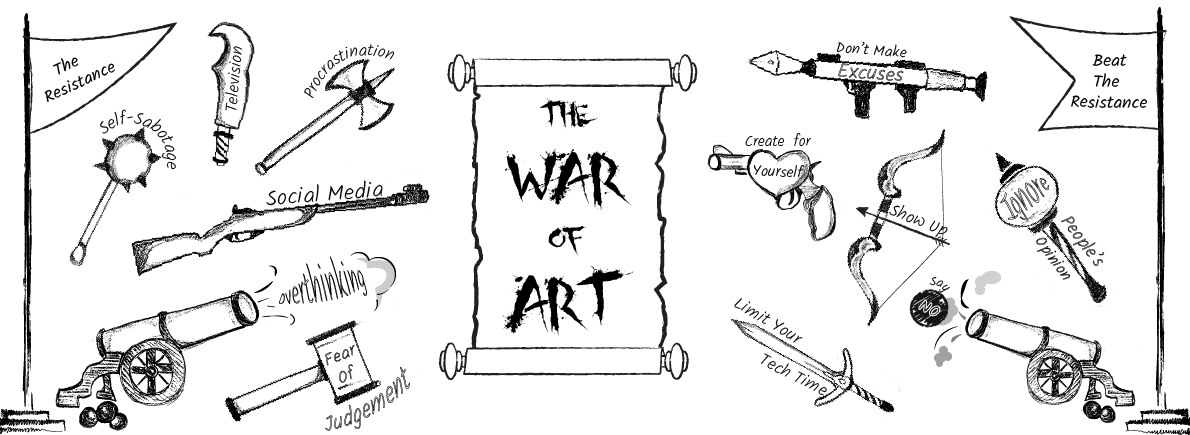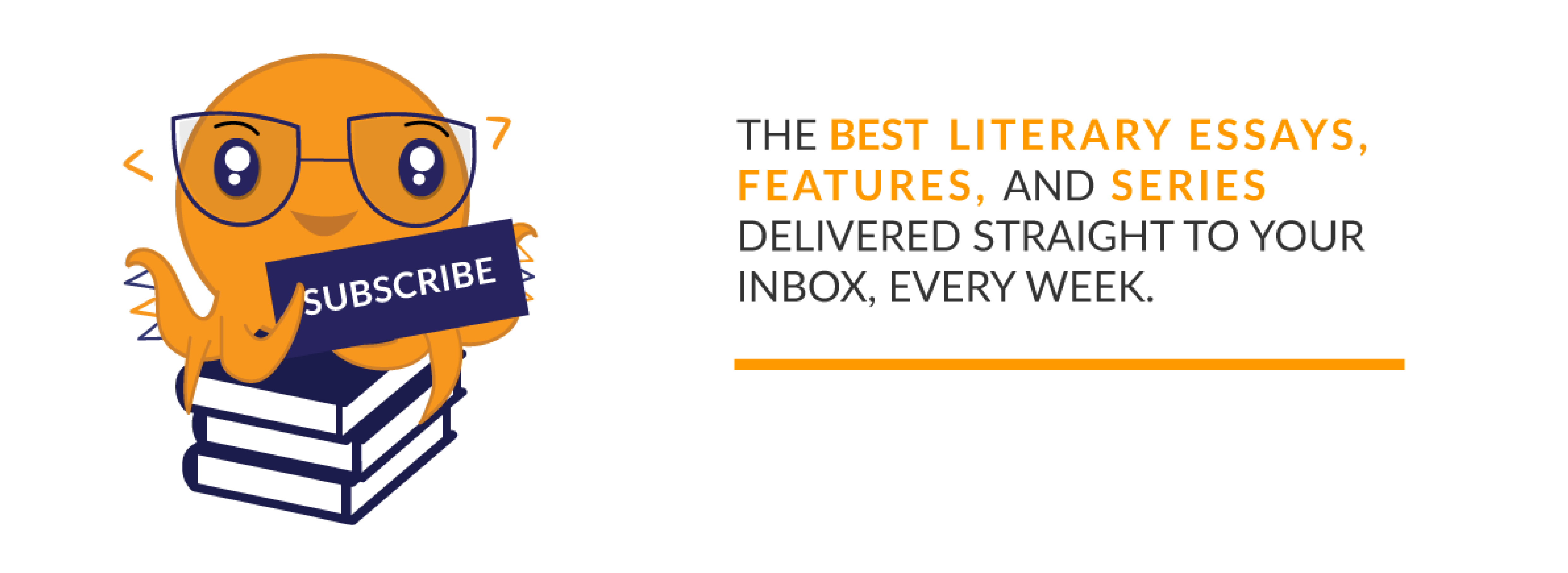JOURNAL
Lessons From Steven Pressfield’s The War Of Art
Where I Learnt All About The Resistance And How To Beat It
————————-
Friday | February 1, 2019
Book: The War Of Art
Author: Steven Pressfield
Over the past two weeks, as part of my experiment on turning to books in search of happiness, I have been reading Steven Pressfield’s The War Of Art to gain some perspective on what stops me from writing and the blocks that keep me from doing what I love.
Steven Pressfield’s The War Of Art is all about breaking through your creative blocks. He believes that what really stops us from achieving our goals is the Resistance. Resistance is always within us, surrounding us – it provides us with perfectly rational and logical reasons as to why we should postpone that important work just till tomorrow- the tomorrow that never comes.
Whether we’re embarking on a new diet, or sitting down to write, or even trying something new and unexpected, a silent enemy lurks everywhere. It plants seeds of doubt in our minds, tells us how easy it would be to give up, suggesting that work can wait, but Netflix can’t. This demon that whispers to us has a name- Resistance. Our habit of self-sabotaging, giving in to distractions instead of focusing on our goal, fear of success (or failure)- all of these are forms of Resistance.
As I read the book, I found myself nodding along as Pressfield explained what Resistance is and the many forms it takes. Here’s what I learnt from The War Of Art.

What Worked
“It’s not the writing part that’s hard. What’s hard is sitting down to write.”
These words from The War Of Art kept resonating in my head and I was astonished to see how true they were. Resistance is the enemy we fail to see coming, it distracts us with its beautiful lies. To counter effect this, in a moment of inspiration, I sat down and started writing. I did not make any excuses or spend time editing in my mind. Believe me, there were over 100 reasons to not do it, but what got me through it was the one reason that mattered above everything else – my love for writing. I wrote and wrote and wrote, and guess what? It did help. The time that I normally would have spent thinking “Nah, I will do it tomorrow” was spent writing instead, and I was deliriously happy to actually get something done. This prompted me to give it another shot the next day, and the day after that.
Pressfield was right- the writing part wasn’t hard; it was the act of sitting down to write.
We don’t tell ourselves, “I’m never going to write my symphony.”
Instead we say, “I am going to write my symphony; I’m just going to start tomorrow.”
The general of the Resistance army is procrastination. A seasoned warrior, it makes us gravitate towards the TV, social media and our phones. Somewhere in the back of our minds is a nagging voice that wants to remind us of our calling, but procrastination is so powerful that it shushes it. The amount of time we spend on distractions doesn’t seem like much until we see what we have done during the day –nothing.
My fight against Resistance started with me sitting down to write after ensuring that there were no distractions. I put my phone in a different room on silent mode and signed out of my social media accounts. As I started writing, the links on the Internet reminding me of a sale, sharing gossip about some actress, or the joke my friend shared on Facebook, were forgotten. Honestly, it was very, very difficult. But with time, I got so engrossed in writing that everything else faded away. When you start doing something you really like and give it your full attention, it consumes your entire being and you find yourself winning the battle against Resistance.
I learnt that we can turn our back on Resistance at any given time, but it takes enormous mental discipline.
People may accuse the awakening writer of “changing”, of “not being the person she was”.
The author believes that this world wants you to become one of the herd, doesn’t want you to stand out. They’re also going through the same Resistance, so comfortable in the cocoon of procrastination and distractions that they want you to be one of them, and retaliate when you disagree. They are so afraid of change, or us leaving them behind, that sometimes they might even react harshly.
He says this is because they might have never achieved what you have, or don’t have the strength to do it. That is why they resort to manipulating and discouraging you. Ignoring such people is one effective option. I tried it and began ignoring people who brought me down or accused me of changing just because I now spent more time on writing than on them. It allowed me to ignore the negative energies of these people and stay away from their discouragement and often unwitting sabotage. It wasn’t easy but it was worth it because the space and time freed up can be used to pick up an extra skill or working on improving existing ones.
What Didn’t Work
“God is all there is.”
The author credits God and his Angels for all our creativity, stating that all we are, and all that we can be, is by God’s will alone. Pressfield is adamant that we have a creative duty to God and that divine forces act through us to create art. When we start to create, heavenly forces come together to help us, the Muse blesses us and we earn her favour. He even claims that the Fifth Symphony was whispered in Beethoven’s ear by the Muse, and was not his own creation. He also says that our talents are not our own, but a miracle bestowed upon us by Angels, who guide us in the process.
If you are an atheist like me and believe in creating your own destiny, then you probably should avoid reading the third part of The War Of Art. The language sounds a little cult-y and it did not resonate with me. I believe that nobody is going to whisper the next award-winning novel in my ear and that practising the art and constantly improving myself are key to my success. The debate about the existence of God aside, I believe that relying on some divine power that blesses you with innate talent serves no purpose as it merely becomes another excuse to not do the work. The drive to improve our skills constantly gives us the impetus to work and if there is no scope to better ourselves, it becomes easy to just stop bothering with our work.
Did I Achieve My Goal?
My goal was to read about becoming a better and more prolific writer by understanding what keeps me from writing and how I can break through those blocks. I learned all about the Resistance and gained some insight on how to overcome it. However, while Pressfield tells us to “Get to work” or “Do it now”, that’s where the advice stops. There are no methods or instructions that might help a beginner overcome the Resistance. Relating everything to divinity didn’t help the author’s case either. The War Of Art is a good book for a five-minute energy boost, but I don’t think it actually helped that much in my creative writing habits.
Having said that, just last week when I was sick, I could have spent the entire day watching re-runs of my favourite show. While this would have made me happy before, now I knew that it was a form of Resistance. So, instead of watching TV, I wrote. I realised that the Resistance is not only keeping me from writing but it is also keeping me from coming closer to my goal of being happy. So, now, whenever I suspect that it might be rearing its ugly head, I work on breaking through it, instead of letting it overcome me. It’s made me happier but I still have a ways to go.
Will It Work For You?
If you’re looking for tips and ways to improve your writing, The War Of Art is not for you. But if you need a quick read about how Resistance works, definitely give it a read. You’ll find yourself nodding along more often than not.
Next Steps
As this book only deals with the philosophical aspect of writer’s block or the Resistance we face, I think my next step should be to look at a more practical approach to writing more and writing better. I need to read a book that helps me learn the essentials of writing fiction- how to develop a plot, create scintillating characters, etc.– and to get an insight into the life of a writer. That is why I have decided to pick Bird By Bird by Anne Lamott as my next read as she not only provides a glimpse into her life but also shares valuable and practical lessons for aspiring writers.
I would love to know your thoughts on what happiness means to you and what actions you’ve taken to be happier.
I will update my findings in my next journal entry scheduled to drop two weeks from now, on February 15, 2019. So, keep an eye out for it or even better, subscribe to The Curious Reader newsletter to have it delivered straight to your inbox.


Prasanna Sawant
Prasanna is a human (probably) who makes stuff up for a living. When she's not sleeping or eating, you'll find her in the quietest corner of the library, devouring yet another hardbound book. She vastly prefers the imaginary world to the real one, but grudgingly emerges from her writing cave on occasion. If you do see her, it's best not to approach her before she's had her coffee.
She writes at The Curious Reader. You can read her articles here.


Check your inbox to confirm your subscription
We hate spam as much as you hate spoilers!